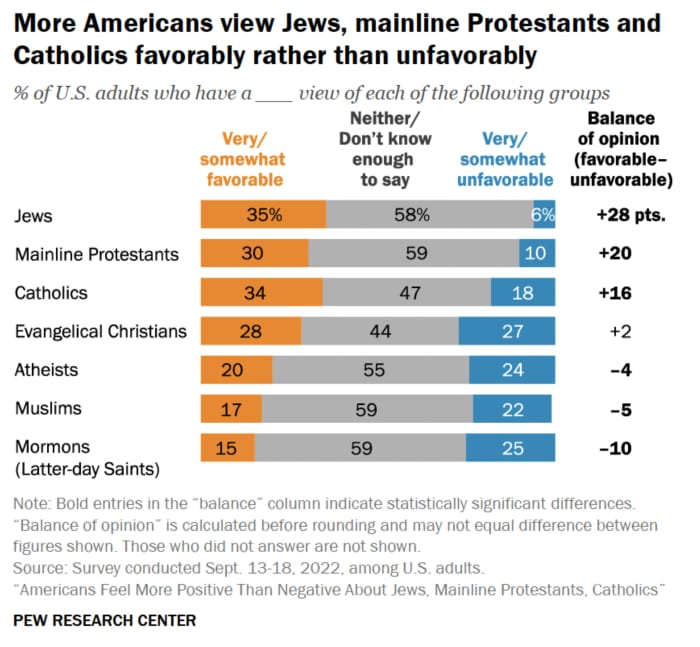This post was originally published on this site
Call it the Jerry Seinfeld effect.
Even as American Jews confront a recent rise in antisemitism, a new survey from the Pew Research Center shows that Jewish people are viewed the most favorably among the major religious groups in the U.S.
The Pew survey found that 35% of Americans have a very or somewhat favorable opinion of Jewish people. That compares with 34% for Catholics, 30% for mainline Protestants, 28% for evangelical Christians, 20% for atheists, 17% for Muslims and 15% for Mormons.
Pew said that 10,588 U.S. adults participated in the survey.
Pew added a few caveats to its findings, saying some respondents “may find it strange or difficult to be asked to rate an entire group of people.” Certainly, that may explain why the majority of respondents — 58%, to be exact — said they had neither a favorable nor unfavorable view of Jews, or didn’t know enough to voice any opinion.
The same applied to other religious groups: For example, 59% of respondents said they didn’t have a favorable or unfavorable view of mainline Protestants, or lacked enough knowledge to have an opinion.
The results of the Pew survey surprised some prominent members of the Jewish community contacted by MarketWatch, especially given the increase in antisemitic incidents.
Indeed, the Anti-Defamation League (ADL), a Jewish organization, reported that 2021 was a record year for such incidents, with 2,717 counted — a 36% increase over 2020. Figures for 2022 will be released this week, the ADL added.
There’s also the fact that Jews constitute a relatively small group — just 2.4% of the overall U.S. adult population, according to a different Pew study.

At the same time, there could be plenty of reasons Jews are viewed so favorably. Jonathan Brent, chief executive of YIVO, an American organization that explores the history and culture of Jewry, noted that the U.S. has a tolerance for people of all religions built into its framework — a tolerance that has not always been associated with Europe, he added. He pointed to Germany during the Nazi regime, as well as antisemitism in other countries at different times.
In turn, that tolerance has allowed Jewish people to flourish in the U.S. in many fields, including science, education and popular culture. And the more that Jewish traditions and icons have become part of this country’s fabric, from comedians like Jerry Seinfeld to food staples like the bagel, the more likely Americans are to have a favorable opinion of the religious group, Brent said.
“Here in America, the Jewish influence is viewed as constructive,” Brent said.
As far as any rise in antisemitism, Brent said, the hatred is “coming from a small, highly defined group” — in short, not the mainstream.
Rabbi Pinchas Taylor, the author of “Pillars of Faith” and “A Jewish Guide to the Mysterious,” seconded that view. Regarding those who hold antisemitic views, Taylor said the “haters are always louder,” so it’s easy to presume they make up a larger group than they really do.
Christian Americans often have a favorable view of Jews since the Jewish Bible — the Old Testament — is part of the Christian faith, Taylor added. It’s “a biblical piece we all share,” he said.
Still, the ADL questioned if the survey really speaks to the way Americans think about the Jewish community. In a statement, the organization pointed to its own research, which it said “suggests that those with prejudices, generally, hide behind ‘I don’t know’ responses.”
In addition, the ADL said that while some people may have positive feelings about Jewish people they’ve encountered, they don’t necessarily distinguish those feelings from antisemitic “dark sentiments about a Jewish cabal or global conspiracy.”
The ADL concluded that such issues point to the need for more research.


